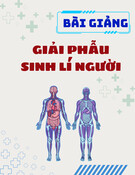
TNU Journal of Science and Technology
230(01): 40 - 47
http://jst.tnu.edu.vn 40 Email: jst@tnu.edu.vn
ISOLATION OF SOME PLASTIC-DEGRADING BACTERIAL STRAINS
FROM SOIL SAMPLES IN VIETNAM
Nguyen Thi Tam Thu1*, To Lan Anh1, Nguyen Thi Kim Linh2, Pham Kien Cuong1
1Institute of New Technology/ Academy of Military Science and Technology
2Northern Mountainous Agriculture and Foretry Science Institute - NOMAFSI
ARTICLE INFO
ABSTRACT
Received:
23/6/2024
Plastics are materials that are widely used in various applications,
especially food packaging. However, these synthetic polymers such as
PE, PET were synthesized from fossil fuels that are very difficult to
degrade naturally and cause serious environmental pollution. One
promising and safe solution to handle this problem is using
microorganisms for plastic biodegradation. Natural microorganisms
show the potential ability to degrade many persistent and toxic
pollutants such as dioxin as well as other inert compounds. In this
study, two strains capable of degrading PE and PET plastics were
reported for their biological properties and biodegradability of these
plastics. Both strains were identified to belong to genus Bacillus and
showed the ability to grow well at 35oC, pH 7 as well as to degrade
protein, starch, cellulose. However, the decomposition of PE and PET
plastic efficiency only reached 4% respectively in 60 days based on
imaging the film surface using a scanning electron microscope, FTIR
spectrum, weight loss and changes in tensile strength and elongation.
Revised:
16/10/2024
Published:
17/10/2024
KEYWORDS
Microorganisms
PE plastic
Bacillus
Biodegradation
Persistant
PHÂN LẬP MT S CHỦNG VI KHUẨN CÓ KHẢ NĂNG PHÂN HỦY NHỰA
TỔNG HỢP TỪ CC MU ĐT VIT NAM
Nguyễn Thị Tâm Thư1*, Tô Lan Anh1, Nguyễn Thị Kim Linh2, Phạm Kiên Cường1
1Viện Công nghệ mới/ Viện Khoa học và Công nghệ quân sự
2Viện Khoa học kỹ thuật Nông lâm nghiệp miền núi phía Bắc
THÔNG TIN BÀI BÁO
TÓM TẮT
Ngày nhận bài:
23/6/2024
Nhựa l nguyên liu đưc s dng ph bin hin nay trong nhiu lnh
vực khc nhau đin hnh như sn xut bao gi thực phm. Tuy nhiên,
cc loi polyme tng hp ny (như PET - Polyethylene terephthalate,
PE-polyethylene), có nguồn gốc dầu mỏ rt khó phân hủy trong điu
kin tự nhiên và gây ô nhiễm môi trường trầm trọng. Mt trong nhng
gii php an ton, tim năng đưc quan tâm nht hin nay đ ng ph
vi tnh trng ny l s dng vi sinh vt trong phân hủy nhựa. Nhiu
vi sinh vt cho thy kh năng ưu vit trong vic phân hủy các cht gây
ô nhiễm khó phân hủy v đc hi như dioxin v nhiu hp cht trơ
khác. Trong nghiên cu này, hai chủng có kh năng phân hủy nhựa PE,
PET đưc công bố v đặc tính sinh học và kh năng phân hủy sinh học
2 loi nhựa này. Kt qu cho thy c 2 chủng đu thuc chi Bacillus, có
kh năng sinh trưởng tốt ở 35oC, pH 7, có hot tính phân hủy các hp
cht như protein, tinh bt và cellulose. Tuy nhiên, hiu sut phân hủy
nhựa PE, PET chỉ đt 4% tương ng trong thời gian 60 ngày. Kh năng
phân hủy của nhựa PE, PET sau khi phân hủy đưc đnh gi thông qua
chp nh b mặt màng bằng kính hin vi đin t quét, ph FTIR, sự
gim khối lưng và sự thay đi đ bn kéo, đ dãn dài.
Ngày hoàn thiện:
16/10/2024
Ngày đăng:
17/10/2024
TỪ KHÓA
Vi khun
Nhựa PE
Bacillus
Phân hủy sinh học
Khó phân hủy
DOI: https://doi.org/10.34238/tnu-jst.10653
* Corresponding author. Email: thu.3t.cnm@gmail.com

TNU Journal of Science and Technology
230(01): 40 - 47
http://jst.tnu.edu.vn 41 Email: jst@tnu.edu.vn
1. Giới thiệu
Polymer có nguồn gốc từ dầu mỏ hay nhựa tng hp c ưu đim là trọng lưng nhẹ, chi phí
thp, kh năng định hình dễ nên chúng đưc ng dng trong rt nhiu lnh vực như bao b, cc vt
dng sinh hot hàng ngày. Ngày nay, nhựa tng hp ngày càng phát trin v đưc s dng nhiu
làm các vt dng dùng 1 lần (túi nilon, ống hút, cốc, chai lọ…). Do đ, lưng rác thi do nhựa sinh
ra ngày càng ln. Do nhựa tng hp là các hp cht trơ rt khó phân hủy trong tự nhiên, có nhiu
loi nhựa mt hng trăm đn hng nghn năm đ phân hủy hon ton. Lưng rác thi nhựa không
chỉ gây mt mỹ quan mà còn gây xi mòn đt, ô nhiễm bin v đi dương. Vi sinh vt thường tương
tác vi các yu tố phi sinh học, chẳng hn như nhit v nh sng, đ thay đi cu trúc polyme, giúp
tăng kh năng phân gii của các enzyme [1]. Nhựa đưc phân hủy sinh học bởi vi khun, nm và
to đưc tìm thy trong nưc rỉ bãi rác, bùn thi và phân hu cơ. Nhng vi sinh vt này sinh tng
hp các enzyme có kh năng phân hủy c polyme tự nhiên và tng hp [2]. Hầu ht các vi khun
có kh năng phân huỷ nhựa là các vi khun ưa nhit, vi nhit đ tối ưu l 30 - 60°C. Tuy nhiên,
do trong tự nhiên chúng phân bố ri rc trong đt, nưc, không khí, điu kin sống chưa tối ưu nên
chưa pht huy ht kh năng tim tàng của chúng. Đ thúc đy nhanh quá trình phân hủy các cht
hu cơ trong điu kin nht định, các vi sinh vt cần tuyn chọn, nuôi cy ở cc điu kin tối ưu
đ chúng sinh lưng ln sinh khối, sau đ đưa ra môi trường dưi dng kích thích hoặc tăng cường
sinh học đ chúng phát trin tốt nht và phân hủy các cht trơ, kh phân hủy. Trên th gii đã c
mt số công bố v kh năng phân hủy các thành phần nhựa khác nhau (PE, PP, HDPE, LDPE) bởi
mt số nhóm vi sinh vt ở các tốc đ khác nhau. Chủng Pseudomonas fluorescens phân hủy 18%
PE trong 270 ngày [3]. Chủng Bacillus vallismortis phân hủy LDPE vi tỷ l 75% trong 120 ngày
[2], [4], [5]. Các chủng Klebsiella pneumonia CH001 và Aspergillus flavus phân hủy HDPE vi tỷ
l 18,4 v 5,5% trong 60 v 100 ngy tương ng [6], [7]. Các chủng có kh năng phân hủy LDPE
vi hiu sut 5,13 - 36,4% trong 45 đn 112 ngày gồm các chi Bacillus cereus A5, Aspergillus
oryzae A5, Trichoderma viride RH3, A. nominus RH06, B. siamensis [2], [5], [8]-[10]. Chi
Pseudomonas có kh năng phân hủy nhiu loi nhựa khác nhau vi tốc đ khc nhau như
Pseudomonas sp. AKS2 phân hủy 15 mg LDPE trong 45 ngày mà không cần quá trình tin x lý,
phân hủy 1,65 mg PES/ngày [11].
2. Vật liệu và phương pháp
2.1. Vật liệu, hóa chất
Các mẫu đt trong khu vực cha cht thi nhựa tng hp (khu bãi rc) đang bị phân hủy ti Vân
Ni, Đông Anh (H Ni).
Các hóa cht dùng cho nuôi cy vi sinh vt như cc cht khoáng, nguồn cacbon dùng đ phân
lp là bt PE (polyethylene), PEG 400 (polyethylenglycol có khối lưng phân t 400) nguồn nito
đu có nguồn gốc từ Sigma, Trung Quốc.
2.2. Phương pháp
2.2.1. Phân lập vi khuẩn có khả năng phân hủy nhựa
Từ các mẫu đt ti khu vực có cht thi nhựa đang phân hủy, ly 10g đt hòa trong 100 ml nưc
muối sinh lý (nồng đ NaCl 0,85%) vô trùng. Trn đu và tin hành pha loãng mẫu theo dãy thp
phân đn nồng đ 10-3, 10-4. Tin hành gt đa cc mẫu đã pha loãng trên môi trường cha bt PE
(polyethylen) và PEG 400 là nguồn cacbon, có thành phần (g/l) như sau: K2HPO4 1, MgSO4.7H2O
0,5 KCl 1, NaNO3 2, PE 10, PEG 400 10; H2O b sung đn 1000 ml, môi trường thch b sung
thêm 18g agar. Ủ đa ở 35oC trong 7-10 ngày. Chọn lọc các khun lc riêng rẽ đ đnh gi kh
năng phân hủy nhựa [2].
2.2.2. Định danh các chủng
Các chủng đã phân lp đưc chp nh khun lc trên đa thch, nh t bào trên kính hin vi đin

TNU Journal of Science and Technology
230(01): 40 - 47
http://jst.tnu.edu.vn 42 Email: jst@tnu.edu.vn
t quét (SEM) và mô t hình thái khun lc, t bo đ thy sự khác bit.
Các chủng có kh năng phân hủy nhựa đưc định danh bằng phương php gii trình tự đon
gen 16S rRNA. Các khun lc đã tinh sch đưc s dng đ tách DNA tng số bằng kit Genomic
DNA Extraction. Cht lưng ADN tng số đưc kim tra bằng đin di trên gel agarose 1% trong
đm TAE 1X. Cc đon ADN tng số đưc s dng lm khuôn đ nhân đon gen 16S rRNA.
Thành phần phn ng PCR (l): ADN tng số 1; Mastermix 2x 12,5; Primer 27f (AGAGTTTGA
TCCTGGCTCAG) và 1492R (GGTTACCTTGTTACGA CTT) 1/1; dH2O 9,5. Chu trình nhit của
phn ng nhân đon gen 16S rRNA (khong 1.500 bp) như sau: 95oC - 10 phút; 35 chu kỳ (95oC -
1 phút, 55oC - 1 phút, 72oC - 2 phút), 72oC - 7 phút; gi nhit đ ở 4oC sau khi phn ng kt thúc
[12]-[14]. Các sn phm PCR đưc làm sch và gii trình tự đon gen 16S rRNA trên thit bị
iSeq100 (Illumina). Các trình tự nucleotide hoàn chỉnh đưc so sánh vi ngân hàng d liu gen của
NCBI bằng cách s dng công c BLAST v đăng ký mã số trên GenBank. Trình tự đon 16S
rRNA của các chủng phân lp và chủng có quan h gần gũi đưc s dng đ xây dựng cây phát
sinh chủng loi dựa trên phần mm Clustal W.
2.2.3. Nghiên cứu đặc điểm sinh học của các chủng
- Các yu tố như nhit đ, pH nh hưởng đn kh năng sinh trưởng của các chủng lựa chọn
đưc đnh gi bằng cách nuôi cy trên môi trường cha PEG (nguồn cacbon duy nht) ở di nhit
đ 20, 25, 30, 35, 40, 45oC (pH cố định là 7) hoặc di pH 4, 5, 6, 7, 8, 9 (nhit đ cố định là 35oC).
Đnh gi kh năng sinh trưởng thông qua vic đo đ đc ở bưc sóng 600 nm (OD600).
- Kh năng sinh enzyme thủy phân tinh bt, protein, xenlulo đưc đnh gi thông qua vic đo
vòng phân gii khi nuôi cy chủng trên cc môi trường cha cc cơ cht tinh bt, CMC và gelatin
tương ng. Sau 48h, nhum vi cơ cht tương ng là dung dịch lugol 1%, dung dịch đỏ Conggo
1% và dung dịch (NH4)2SO4 bão hòa. Vòng phân gii đưc tính l đường kính vòng phân gii (D,
mm) trừ đi đường kính khun lc (d, mm).
2.2.4. Đánh giá khả năng phân hủy nhựa
Kh năng phân hủy nhựa đưc đnh gi thông qua nuôi cy các chủng có kh năng phân hủy
nhựa trên nguồn cơ cht là nhựa PET, PE và nuôi lắc ở điu kin tốt nht. Sau 60 ngày, ly ming
nhựa ra ra sch sinh khối v lm khô. Cân lưng nhựa còn li và so sánh vi lưng nhựa ban đầu
[15]. Kh năng phân hủy còn đưc đnh gi thông qua quan st b mặt màng trên kính hin vi đin
t SEM, đo đ bn kéo, đ dãn dài và ph FTIR của màng sau quá trình phân hủy [15].
2.2.5. Phân tích phổ FTIR
Các mẫu nhựa trưc và sau phân hủy đưc phân tích cu trúc ph trên máy quang ph hồng
ngoi bin đi bằng máy FTIR Spectrum Two (Anh) của Vin Hóa học vt liu đ xc định các
nhóm chc trong phân t bị thay đi trong quá trình phân hủy. Ph IR đưc đọc từ bưc sóng 400-
4000 cm-1 vi khong cách 4 cm-1 trong áp sut chân không.
2.2.6. Quan sát bề mặt trên kính hiển vi điện tử quét
Các mẫu màng nhựa trưc và sau khi phân hủy đưc ra sch sinh khối và quan sát b mặt dưi
kính hin vi đin t quét Hitachi 4800 ti Vin Khoa học Vt liu (Vin Hàn lâm Khoa học và
Công ngh Vit Nam).
2.2.7. Đo độ bền kéo và độ dãn dài của màng
Đ bn kéo v đ dãn dài của màng nhựa PE, PET trưc và sau khi phân hủy đưc đo đ đnh
giá sự thay đi v tính cht vt lý của màng [15]. Phép đo đưc thực hin ti Vin Khoa học vt
liu (Vin Hàn lâm Khoa học và Công ngh Vit Nam). Các chỉ tiêu đưc phân tích trên Máy phân
tích cơ lý đa năng GOTECH AI-7000M, theo tiêu chun ASTM D882.
2.2.8. Đánh giá khả năng phân hủy sinh học của chủng

TNU Journal of Science and Technology
230(01): 40 - 47
http://jst.tnu.edu.vn 43 Email: jst@tnu.edu.vn
Kh năng phân hủy sinh học đưc đnh gi theo TCVN 9494:2012 [16] thông qua vic xc định
sự thay đi khối lưng nhựa v lưng CO2 to thành trong quá trình phân hủy bởi vi sinh vt (VSV).
3. Kết quả
3.1. Phân lập, tuyển chọn vi khuẩn có khả năng phân hủy nhựa
Từ các mẫu đt thu thp đưc từ các vị trí ô nhiễm cht thi nhựa, 6 chủng VSV có kh năng
sinh trưởng trên môi trường cha PEG 400 và PE là nguồn cacbon đưc phân lp và ký hiu lần
lưt là PE13, PE20, PEX3, PETBs, PET6, PETG1. Các chủng ny đưc nuôi cy riêng rẽ và s
dng đ đnh gi kh năng phân hủy nhựa PE, PET. Kt qu trình bày trên Bng 1 cho thy chủng
PEX3 có kh năng phân hủy PE và chủng PETBs có kh năng phân hủy PET cao hơn (c sự gim
khối lưng nhựa nhiu hơn) nên đưc chọn đ phân loi bằng quan sát hình thái khun lc, t bào
v định danh bằng gii trình tự đon gen 16S rRNA.
Bảng 1. Kết quả đánh giá khả năng phân hủy nhựa PE, PET của các chủng phân lập được
TT
Tên chủng
% giảm với nhựa PE
% giảm với nhựa PET
m1 (mg)
m2 (mg)
% phân hủy
m1 (mg)
m2 (mg)
% phân hủy
1.
PETBs
98,3
97,8
0,51
80,8
79,3
1,86
2.
PE13
86,3
85,9
0,46
83,2
82,8
0,48
3.
PE20
89,2
88,9
0,34
85,4
84,9
0,59
4.
PEX3
95,4
94,2
1,26
88,1
87,7
0,45
5.
PET6
85,1
84,9
0,24
84,4
83,9
0,59
6.
PETG1
89,2
88,9
0,34
96,1
95,7
0,42
Ghi chú: m1: khối lượng ban đầu; m2: khối lượng sau phân hủy.
3.2. Định danh các chủng phân hủy nhựa
Hình 1. Hình ảnh tế bào và khuẩn lạc của 2 chủng
PEX3 và PETBs
Hình 2. Cây phát sinh chủng loại của 2 chủng
phân lập được và các chủng liên quan gần gũi
Hình thái khun lc 2 chủng lựa chọn đưc quan st trên đa thch, hình thái t bo đưc làm
tiêu bn v quan st dưi kính hin vi đin t quét (SEM) vi đ phng đi 5000 lần. Hình thái
khun lc và t bo đưc th hin trên Hình 1. Sau khi gii trình tự đon gen 16S rRNA, 2 chủng
PEX3 và PETBs đu thuc chi Bacillus, trong đ chủng PEX3 có trình tự đon gen 16S rRNA
tương đồng 99,3% vi các chủng thuc chi Bacillus như B. stercoris D7XPN1, B. subtilis BCRC
10255, B. subtilis JCM 1465 nên đưc đặt tên là Bacillus sp. PEX3. Chủng PETBs có trình tự đon
gen 16S rRNA tương đồng 99,75% vi các chủng thuc loài Bacillus subtilis như B. subtilis BCRC
10255, NBRC 13719, DSM10 nên đưc đặt tên là Bacillus subtilis PETBs. Các chủng phân hủy

TNU Journal of Science and Technology
230(01): 40 - 47
http://jst.tnu.edu.vn 44 Email: jst@tnu.edu.vn
nhựa thuc chi Bacillus cũng đã đưc công bố [2], [15]. C 2 chủng PEX3 v PETBs đã đưc đăng
ký trình tự gen 16S rRNA trên GenBank vi mã số tương ng là PP564737 và PP564738. Cây phát
sinh chủng loi của 2 chủng này và các chủng liên quan gần gũi dưc trình bày trên Hình 2.
3.3. Đặc điểm sinh học của các chủng lựa chọn
Cc đặc đim sinh học như kh năng sinh enzyme ngoi bào thủy phân tinh bt, CMC, protein
cùng như nhit đ và pH tối ưu đưc trình bày trên Bng 2, Bng 3. Kt qu trình bày trên Bng 2
cho thy c 2 chủng đu có nhit đ sinh trưởng tốt nht là 35oC, pH 7, có th sinh trưởng ở di
nhit đ từ 25-45oC, pH từ 5-9. C 2 chủng đu có kh năng sinh enzyme thủy phân c tinh bt,
CMC, protein vi hot tính khác nhau (Bng 3). Chủng PETBs có kh năng sinh enzyme thủy phân
các cht tinh bt, protein, CMC cao hơn so vi chủng PEX3. Trong nhiu nghiên cu đã chng
minh, chủng có kh năng thủy phân cc cơ cht tinh bt, protein v CMC cũng c kh năng phân
hủy hp cht nhựa tng hp như PE, PP, PET [13], [14].
Bảng 2. Điều kiện sinh trưởng tốt nhất của 2 chủng PEX3 và PETBs
Nhiệt độ (oC)
Chủng PEX3
(OD600)
Chủng PETBs
(OD600)
pH
Chủng PEX3
(OD600)
Chủng PETBs
(OD600)
25
0,873
0,892
5
0,884
0,762
30
1,231
1,328
6
1,368
1,435
35
1,642
1,763
7
1,893
1,963
40
1,102
1,218
8
1,268
1,321
45
0,535
0,542
9
0,878
0,842
Bảng 3. Khả năng sinh enzyme ngoại bào của các chủng
Đường kính vòng phân giải (D-d) (mm)
Chủng PEX3
Chủng PETBs
Hot tính phân hủy tinh bt
18
22
Hot tính phân hủy protein
16
17,8
Hot tính phân hủy CMC
14,5
16,4
3.4. Khả năng phân hủy nhựa PET, PE của các chủng
Kh năng phân hủy nhựa PET và PE của các chủng đưc đnh gi thông qua sự thay đi b mặt
màng, cu trúc ph FTIR và sự thay đi v khối lưng sau khi nuôi cy ở phòng thí nghim. Kt
qu phân tích ph FTIR cho thy c 2 mẫu PE, PET sau khi phân hủy có xut hin 1 số peak giống
và khác so vi ban đầu (Hình 3), chng tỏ đã c sự thay đi trong cu trúc màng. Tuy nhiên, vì tốc
đ phân hủy sinh học rt chm nên vẫn còn cc peak như ban đầu (chưa bị phân hủy). Hình nh
quan sát b mặt mng cũng cho thy có sự thay đi rõ rt gia mng trưc và sau phân hủy (Hình
4). Tuy nhiên, màng PE thy có sự thay đi rõ rng hơn v cu trúc b mặt chng tỏ có sự phân
hủy trên b mặt nhiu hơn. Tuy nhiên, cần xc định sự thay đi v khối lưng (theo % khối lưng
ban đầu). Kt qu đnh gi kh năng phân hủy v khối lưng trên Bng 4 cho thy nhựa PE bị phân
hủy 4,08% sau 60 ngày và màng PET bị phân hủy khong 3,97% sau 60 ngày x lý vi các chủng
PEX3 v PETBs tương ng. Kt qu ny l tương đương so vi mt số nghiên cu trưc đây v
kh năng phân hủy màng nhựa tng hp [2], [13], [15].
Bảng 4. Khả năng phân hủy nhựa PE, PET sau 60 ngày
Ban đầu (mg)
Sau 60 ngày (mg)
% phân hủy
Nhựa PE
98,1
94,1
4,08
Nhựa PET
85,7
82,3
3,97
Đ khẳng định v kh năng phân hủy sinh học, mng PE, PET trưc và sau x lý còn đưc đnh
giá sự thay đi v đ bn kéo, đô dãn di của màng phn ánh bn cht của sự phân hủy màng. Kt
qu trình bày trên Bng 4 cho thy màng PE gim đ bn kéo từ 17,2 xuống con 12,6 Mpa v đ
dãn dài gim từ 4,8 xuống còn 3,2%. Màng PET có sự thay đi ít hơn, đ bn kéo gim từ 6,8
xuống 6,2 Mpa v đ dãn dài gim từ 3,1 xuống còn 2,5%.


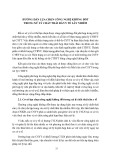
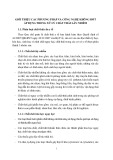
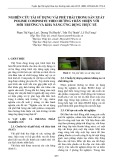
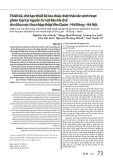
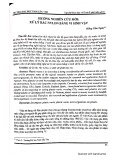
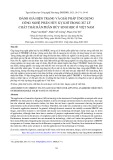
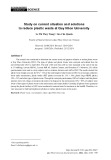
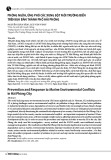
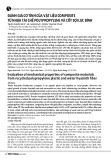

![Giáo trình Vi sinh vật học môi trường Phần 1: [Thêm thông tin chi tiết nếu có để tối ưu SEO]](https://cdn.tailieu.vn/images/document/thumbnail/2025/20251015/khanhchi0906/135x160/45461768548101.jpg)





![Bài giảng Sinh học đại cương: Sinh thái học [mới nhất]](https://cdn.tailieu.vn/images/document/thumbnail/2025/20250812/oursky02/135x160/99371768295754.jpg)



![Đề cương ôn tập cuối kì môn Sinh học tế bào [Năm học mới nhất]](https://cdn.tailieu.vn/images/document/thumbnail/2026/20260106/hoang52006/135x160/1251767755234.jpg)

![Cẩm Nang An Toàn Sinh Học Phòng Xét Nghiệm (Ấn Bản 4) [Mới Nhất]](https://cdn.tailieu.vn/images/document/thumbnail/2025/20251225/tangtuy08/135x160/61761766722917.jpg)
